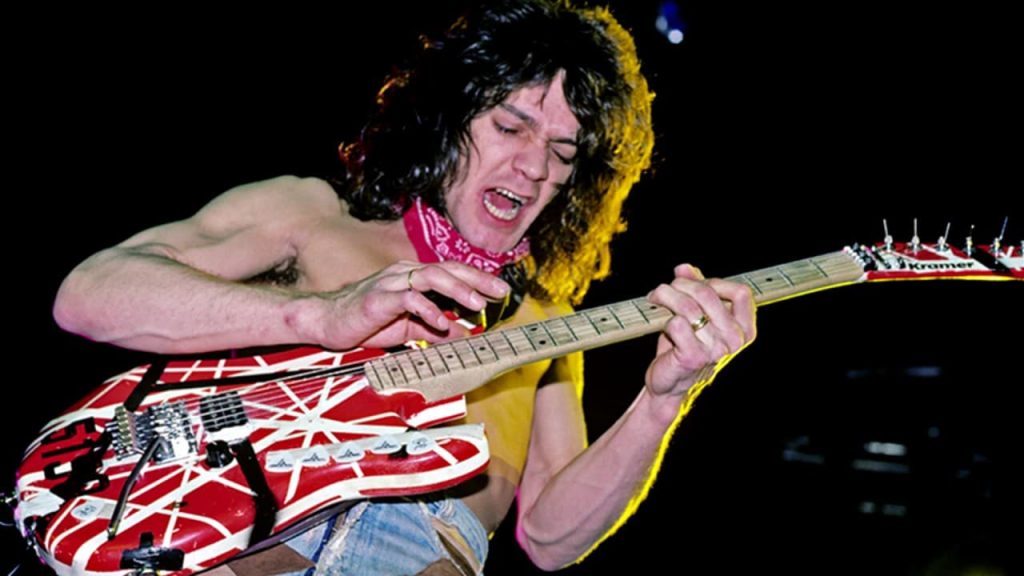
A Sonic Revolution: The Legacy of Van Halen’s “Eruption”
In the annals of rock history, certain moments stand as pivotal turning points, reshaping the musical landscape and inspiring generations to come. Van Halen’s “Eruption” is undeniably one of these monumental milestones. Released on February 10, 1978, as part of their eponymous debut album, this instrumental track not only showcased the prodigious talent of Eddie Van Halen but also redefined the possibilities of electric guitar in rock music.
“Eruption” is a brief yet explosive piece, clocking in at just 1 minute and 42 seconds. Despite its brevity, the track’s impact was immediate and profound. At the time of its release, the song did not chart as a standalone single. However, the “Van Halen” album itself achieved significant success, reaching number 19 on the Billboard 200 chart and eventually being certified multi-platinum. The album’s success was a testament to the band’s innovative sound and the magnetic pull of tracks like “Eruption.”
The story behind “Eruption” is as serendipitous as it is fascinating. Originally, the piece was not intended for the album. Eddie Van Halen used it as a warm-up exercise during rehearsals. However, upon hearing it, producer Ted Templeman insisted that it be recorded and included in the album. Reflecting on the recording, Eddie once mentioned, “I didn’t even play it right. There’s a mistake at the top end of it.” This humble acknowledgment underscores the raw and unfiltered genius captured in that spontaneous session.
At its core, “Eruption” is a showcase of Eddie Van Halen’s revolutionary approach to guitar playing. The track is renowned for its two-handed tapping technique, rapid arpeggios, and intricate harmonics. This approach was not entirely new, but Eddie’s execution and flair brought it to the forefront of rock guitar playing. The song begins with a cascading flurry of notes, building intensity before launching into a blistering solo that leaves listeners in awe. The technical prowess displayed in “Eruption” set a new standard for guitarists and inspired countless musicians to explore new techniques and sounds.
Beyond its technical brilliance, “Eruption” holds a deeper significance. It symbolizes a moment of creative freedom and unbridled expression. In an era dominated by punk’s raw simplicity and disco’s polished grooves, Van Halen introduced a fresh and electrifying energy to the rock scene. “Eruption” served as a bold statement, announcing the arrival of a band that was unafraid to push boundaries and redefine genres.
For many fans, especially those who experienced its release firsthand, “Eruption” evokes a sense of nostalgia. It harkens back to a time when discovering new music was a tactile experience—vinyl records, turntables, and the anticipation of dropping the needle to unveil uncharted sonic territories. The track’s raw energy and innovation encapsulate the spirit of the late 1970s rock scene, a period marked by experimentation and a hunger for new sounds.
In the years following its release, “Eruption” has been celebrated as one of the greatest guitar solos of all time. Its influence is evident in the works of numerous guitarists who cite Eddie Van Halen as a pivotal inspiration. The track has been covered, studied, and dissected extensively, yet its original magic remains undiminished.
Reflecting on the legacy of “Eruption,” it’s clear that its significance extends beyond its notes and techniques. It represents a fusion of passion, innovation, and spontaneity—a snapshot of a moment when a young guitarist’s warm-up session transformed into a defining piece of rock history. For those who lived through its debut, “Eruption” is more than just a song; it’s a cherished memory, a reminder of the exhilarating evolution of music, and a testament to the enduring power of artistic expression.
As we listen to “Eruption” today, we’re not just hearing a guitar solo; we’re connecting with a piece of cultural heritage that continues to inspire and resonate. It’s a reminder of the boundless possibilities that emerge when talent meets opportunity, and how a spontaneous moment in a recording studio can ignite a revolution that echoes through the decades.